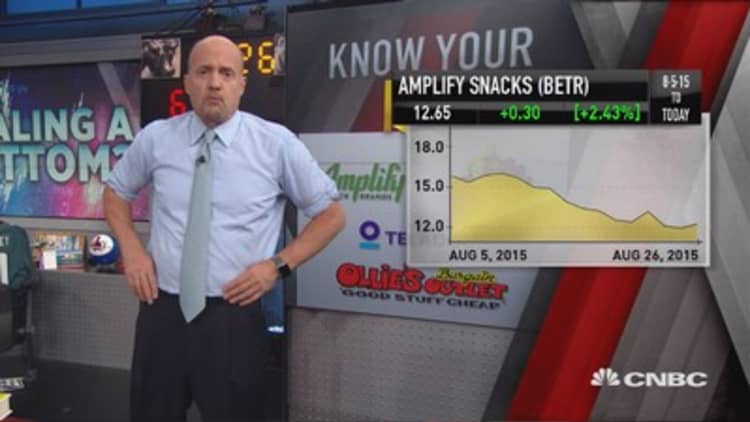
While most investors are trying to figure out if Wednesday's rebound is the real deal, Jim Cramer reminded us that there are a lot of factors that can influence the market's action. One of those factors is the IPO market.
"When you see a lot of companies coming public, especially a lot of low quality companies, then that is a very bad sign for the averages because it means the stock market is getting flooded with new supply," the "Mad Money" host said.
Just like any market when supply exceeds demand, that creates lower prices. And when the supply of new deals dries up, it is a sign of a nearing bottom.
In June alone, there were 35 companies that went public or nearly two IPOs for each trading day. That was a sign that worried Cramer, as it coincided with a peak in the market. The good news is that the pace of new deals did slow down for a bit, as July had 17 IPOs. That is still a lot, but fewer than June.
So far in August there has been only 10 deals, which is a more reasonable number for Cramer. But what he really wants to see is no IPOs, at least for the moment. Fortunately there hasn't been a new deal since the market took a nose dive in the past week and a half and there are no new IPOs scheduled for the next week and a half.
"That gives me hope that a bottom might be closer at hand than many people think, even after a nice up day like this one," Cramer said.
However, it could also be bad for what Cramer called the "billion dollar unicorns." Those are private companies with huge overvaluations that are hoping to come public at absurd levels.
What stood out most to Cramer among the few IPOs that have come public recently is the drastic difference in quality for each company. That is why he reviewed each one of them, to give investors a sense of what kind of companies that have hit the market recently.
First was Amplify Snack Brands, the maker of SkinnyPop popcorn with no artificial ingredients. When Cramer took a look, he saw that Amplify's earnings have actually been shrinking in recent quarters, and the company has an ugly balance sheet with $239 million in debt. Thus, Cramer would rather own a high quality food company with decent yield like General Mills or PepsiCo.
Read more from Mad Money with Jim Cramer
Cramer Remix: Market mechanics can't be trusted
Cramer: The huge surge reversal—get ready for more
Cramer: Time to sell your danger stocks
Next up was Planet Fitness, one of the largest and fastest growing operators and franchisers of fitness centers in the U.S. The company was taken public by TSG, a private equity firm that still owns a bulk of the common stock and controls more than 65 percent of the voting power. In other words, Planet Fitness is not accountable to a wide base of shareholders, only TSG.
Cramer was also alarmed by the enormous $500 million debt burden, especially since it is an expensive stock. Ultimately it was too expensive in Cramer's opinion for a fitness center chain, and he recommended staying away.
Another deal that Cramer liked was Teladoc, but only into weakness. He also considered warming up to Ollie's Bargain Outlet if the environment were more growth friendly.
"After this brutal decline of seasoned securities, let's just say the comparisons are too difficult for these newly public stocks to be as compelling as they might have been in a stronger market," Cramer said.
Correction: This article has been updated to reflect Amplify Snack Brands' level of debt.
Questions for Cramer?
Call Cramer: 1-800-743-CNBC
Want to take a deep dive into Cramer's world? Hit him up!
Mad Money Twitter - Jim Cramer Twitter - Facebook - Instagram - Vine
Questions, comments, suggestions for the "Mad Money" website? madcap@cnbc.com



